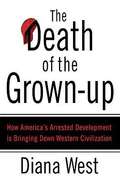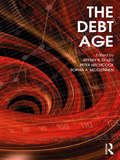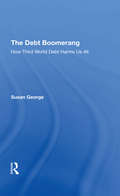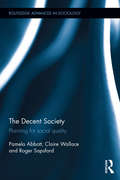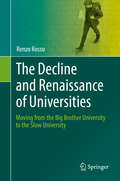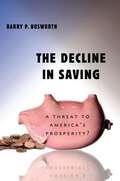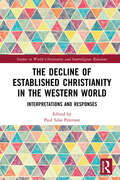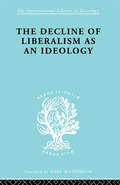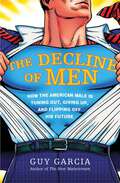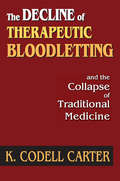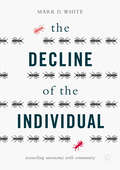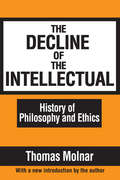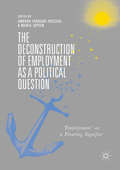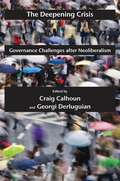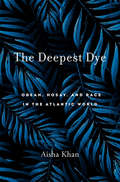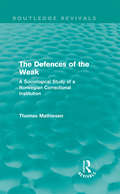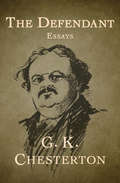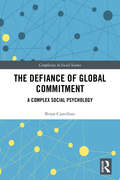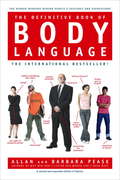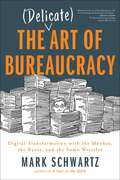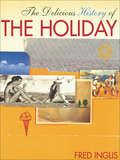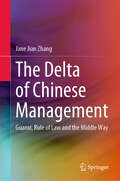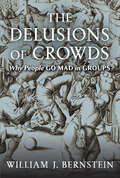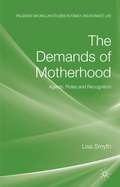- Table View
- List View
The Death of the Grown-Up: How America's Arrested Development is Bringing Down Western Civilization
by Diana West"WHERE HAVE ALL THE GROWN-UPS GONE?" That is the provocative question Washington Times syndicated columnist Diana West asks as she looks at America today. Sadly, here's what she finds: It's difficult to tell the grown-ups from the children in a landscape littered with Baby Britneys, Moms Who Mosh, and Dads too "young" to call themselves "mister. " Surveying this sorry scene, West makes a much larger statement about our place in the world: "No wonder we can't stop Islamic terrorism. We haven't put away our toys!" As far as West is concerned, grown-ups are extinct. The disease that killed them emerged in the fifties, was incubated in the sixties, and became an epidemic in the seventies, leaving behind a nation of eternal adolescents who can't say "no," a politically correct population that doesn't know right from wrong. The result of such indecisiveness is, ultimately, the end of Western civilization as we know it. This is because the inability to take on the grown-up role of gatekeeper influences more than whether a sixteen-year-old should attend a Marilyn Manson concert. It also fosters the dithering cultural relativism that arose from the "culture wars" in the eighties and which now undermines our efforts in the "real" culture war of the 21st century--the war on terror. With insightful wit, Diana West takes readers on an odyssey through culture and politics, from the rise of rock 'n' roll to the rise of multiculturalism, from the loss of identity to the discovery of "diversity," from the emasculation of the heroic ideal to the "PC"-ing of "Mary Poppins," all the while building a compelling case against the childishness that is subverting the struggle against jihadist Islam in a mixed-up, post-9/11 world. With a new foreword for the paperback edition, "The Death of the Grown-up,"is a bracing read from one of the most original voices on the American cultural scene.
The Debt Age
by Peter Hitchcock Jeffrey R Di Leo Sophia A McClennenThis collection of essays, by some of the most distinguished public intellectuals and cultural critics in America explores various dimensions of what it means to live in the age of debt. They ask, what is the debt age? For that matter, what is debt? Is its meaning transhistorical or transcultural? Or is it imbued in ideology and thus historically contingent? What is the relationship between debt and theory? Whose debt is acknowledged and whose is ignored? Who is the paradigmatic subject of debt? How has debt affected contemporary academic culture? Their responses to these and other aspects of debt are sure to become required reading for anyone who wants to understand what it means to live in the debt age.
The Debt Boomerang: How Third World Debt Harms Us All (Transnational Institute Ser.)
by Susan GeorgeThis book examines six major 'Debt Connections'; six ways in which the third world 'Debt Boomerang' strikes the North as it flies back from the South: environmental destruction, drugs, costs to taxpayers, lost jobs and markets, immigration pressures, and heightened conflict and war.
The Decent Society: Planning for Social Quality (Routledge Advances in Sociology)
by Roger Sapsford Pamela Abbott Claire WallaceThe search for ‘the Decent Society’ – a fit place in which to live – has informed policy at both governmental and international level. This book analyses its nature and devises a consistent way of measuring the concept world-wide on the basis of a coherent theory of agency within social structure. Influenced by classical sociology and by the economist Amartya Sen, the book posits that societies need to create (a) economic security, (b) social cohesion, (c) social inclusion, and (d) the conditions for empowerment. The model is interactive and recursive; each component provides the requirements for each of the others. This book outlines the sociopolitical framework underlying ’the Decent Society' and summarises a decade of research, some of which has had a formative impact on governments’ policies. The first half contains studies of social quality based on surveys in the former Soviet Union and sub-Saharan Africa, while the second half describes the construction of a Decent Society Index for comparing very different countries across the world. This book and the index it develops will be of interest both to academics and researchers in sociology, politics, economics, psychology, social policy and development studies and to policy-makers in government, local government and the NGOs.
The Decline and Renaissance of Universities: Moving from the Big Brother University to the Slow University
by Renzo RossoInstead of following the Magna Charta Universitatum, the declaration of the principles of knowledge signed in 1988 in Bologna, the academic approach pursued in Europe and the other continents over the past 30 years has strictly employed a utilitarian model of higher education. This jeopardizes academic freedom, shared governance and tenure, the three pillars of the long-established model of universities. Scientific conformism and fragmentation, educational bias and authoritarianism are the major drawbacks, together with a poor readiness to meet the emerging challenges in the labor market and technology. In this book, Renzo Rosso presents a new model for countering these developments, e.g. by establishing novel democratic rules for university governance. The Slow University paradigm positions culture and education as essential tools for the long-term survival of humankind.
The Decline in Saving
by Barry P. BosworthLongtime Brookings economist and former presidential adviser Barry Bosworth examines why saving rates in the United States have fallen so precipitously over the past quarter century, why the initial consequences were surprisingly benign, and how reduced saving will affect the future well-being of Americans. The Decline in Saving provides an extensive and unparalleled account of the complexity of present saving patterns, an issue made even more serious by the 2008-09 global economic and financial crises. It objectively examines saving at both the individual household and the aggregate economy levels to understand whether the U.S. decline in saving is truly a threat to American prosperity.Highlights from The Decline in Saving:"The magnitude of the two-decade-long fall in household saving has been truly astonishing; it is even more surprising in view of the fact that the large cohort of baby boomers should have been in their peak saving years.""If Americans save so little, why are they so rich? This divergence emerges because the conventional measure of saving excludes all forms of capital gains....""Saving behavior appears to be influenced in important ways by country-specific institutional factors along with a few common determinants, such as income growth, demographic changes, and variations in private wealth.""In the aggregate, the United States has had a negative net national saving rate since the onset of the financial crisis, and it now relies on foreign resource inflows to finance all its capital accumulation and a portion of its consumption.""The optimistic projections of just a few years ago about the future well-being of retirees now seem seriously dated."
The Decline in Saving: A Threat to America's Prosperity?
by Barry P. BosworthLongtime Brookings economist and former presidential adviser Barry Bosworth examines why saving rates in the United States have fallen so precipitously over the past quarter century, why the initial consequences were surprisingly benign, and how reduced saving will affect the future well-being of Americans. The Decline in Saving provides an extensive and unparalleled account of the complexity of present saving patterns, an issue made even more serious by the 2008-09 global economic and financial crises. It objectively examines saving at both the individual household and the aggregate economy levels to understand whether the U.S. decline in saving is truly a threat to American prosperity.Highlights from The Decline in Saving:"The magnitude of the two-decade-long fall in household saving has been truly astonishing; it is even more surprising in view of the fact that the large cohort of baby boomers should have been in their peak saving years.""If Americans save so little, why are they so rich? This divergence emerges because the conventional measure of saving excludes all forms of capital gains....""Saving behavior appears to be influenced in important ways by country-specific institutional factors along with a few common determinants, such as income growth, demographic changes, and variations in private wealth.""In the aggregate, the United States has had a negative net national saving rate since the onset of the financial crisis, and it now relies on foreign resource inflows to finance all its capital accumulation and a portion of its consumption.""The optimistic projections of just a few years ago about the future well-being of retirees now seem seriously dated."
The Decline of Established Christianity in the Western World: Interpretations and Responses (Studies in World Christianity and Interreligious Relations)
by Paul PetersonWhile Church attendance in the West is often cited as being in decline, it is argued that this applies primarily to the older established forms of Christianity. Other expressions of the faith are, in fact, stable or even growing. This volume provides multidisciplinary interpretations of and responses to one of the most complicated and controversial issues regarding the global transformation of Christianity today: the decline of "established Christianity" in the Western world. It also addresses the future of Christianity in the West after the decline. Drawing upon historical research, sociology, religious studies, philosophy and theology, an international panel of contributors provide new theoretical frameworks for understanding this decline and offer creative suggestions for responding to it. "Established Christianity" is conceptualized as historically, culturally, socially and politically embedded religion (with or without official established status). This is a dynamic volume that gives fresh perspective on one of the great social changes taking place in the West today. As such, it will be of great interest to scholars of religious sociology, history and anthropology, as well as theologians.
The Decline of Liberalism as an Ideology (International Library of Sociology)
by John H. HallowellMany of the earliest books, particularly those dating back to the 1900s and before, are now extremely scarce and increasingly expensive. We are republishing these classic works in affordable, high quality, modern editions, using the original text and artwork.
The Decline of Men: How the American Male Is Getting Axed, Giving Up, and Flipping Off His Future
by Guy GarciaWhy are so many of today's supermen super-clueless?Why do so many men prefer the escapist digitized world of Spike TV and Grand Theft Auto to the reality of their own lives?An entire generation of men is slacking off. The struggle to redefine what being a man means in today's world has resulted in widespread male confusion, leading to rampant malaise, alienation, and disconnection. In this eye-opening exploration of this crisis of contemporary American manhood, award-winning journalist Guy Garcia sheds light on a problem that has wreaked havoc on the American family. Packed with startling statistics, informed by pop culture, and narrated in the entertaining style for which Guy Garcia is known, The Decline of Men is an important wake-up call to the distressing reality of the American male
The Decline of Therapeutic Bloodletting and the Collapse of Traditional Medicine: And The Collapse Of Traditional Medicine
by K. Codell CarterOver the course of a single generation, without significant discussion or debate, a key practice of traditional medicine was almost completely abandoned in mid-nineteenth-century Europe. K. Codell Carter's book describes how and why bloodletting was abandoned, noting that it was part of a process in which innovation was required so that modern scientific medicine could begin. This book is a masterful study on the collapse of a traditional medical practice. Bloodletting had been a prominent medical therapy in early nineteenth-century Europe and can be traced back to Greek and Roman physicians. The Hippocratic corpus contains several discussions of bloodletting. Galen, the most famous physician in classical antiquity, wrote tracts explaining and defending the practice. It was employed in ancient Egypt and is the most commonly mentioned therapy in the Babylonian Talmud. Indeed, it was practiced in virtually every part of the ancient world. Even though the practice abruptly ceased, there was little argument against it or reason to believe it ineffective. In reality, bloodletting actually worked. However, the rise of modern medicine required not just a change in how disease and causation were conceived, but also a change in the role of medicine in society. It has been claimed that the collapse of traditional medicine was a precondition for the rise of modern medicine, but there has been little support for this assertion before now. Carter provides this missing support. The result is a fascinating study in the history of medical practice and social expectations.
The Decline of the Individual
by Mark D. WhiteThis book explores the steady decline in the status of the individual in recent years and addresses common misunderstandings about the concept of individuality. Drawing from psychology, neuroscience, technology, economics, philosophy, politics, and law, White explains how and why the individual has been devalued in the eyes of scholars, government leaders, and the public. He notes that developments in science have led to doubts about our cognitive competence, while assumptions made in the humanities have led to questions about our moral competence. In this book, White goes on to argue that both of these views are mistaken and that they stem from overly simplistic ideas about how individuals make choices, however imperfectly, in their interests, which are multifaceted and complex. In response, he proposes a new way to look at individuals that preserves their essential autonomy while emphasizing their responsibility to others, inspired by the moral philosophy of Immanuel Kant and the legal and political philosophy reflected in the Bill of Rights to the U. S. Constitution. This book explains how individuality combines both rights and responsibilities, reconciles the popular yet false dichotomy between individual and society, and provides the basis for a humane and respectful civil society and government. This book is part of White's trilogy on the individual and society, which includes The Manipulation of Choice and The Illusion of Well-Being.
The Decline of the Intellectual
by Thomas MolnarIn perhaps his most famous book, The Decline of the Intellectual, Thomas Molnar launches into a fundamental critique of the intellectual class. He sees it as a group that had lost its way, collapsing a sense of vision into political activism, social engineering, and culture manipulation, and abandoning the writing, philosophizing, and scholarship that had occupied their predecessors. Universities began to produce factory-like, faceless citizens, as the job market became the arbiter of education and culture. Today's professors are recruited from this group of job seekers, and hence, have a shared indifference toward learning.Molnar likens present-day intellectuals to the earlier Marxists who elaborated their Utopian model in the Communist party. The campus intellectuals' objective is to transform the university into a replica and a laboratory of the ideal society. Colleges and universities thus become sources of propaganda of various political, financial, cultural, and ideological trends, not only among students, but professors as well. The thirty years separating editions have done nothing to weaken such a critical appraisal.In his new introduction, Molnar writes that the decline of intellectuals has extended outside of the campus to the arts, the public discourse, and the robotization caused by technology. On the initial publication of this work, Frank S. Meyer wrote in Modern Age, Thomas Molnar's book is not only true; it is intellectually exciting and it will remain a necessary handbook for anyone interested in the decisive problem of the 20th century. The Decline of the Intellectual is essential reading for sociologists, political scientists, educators, and university officials. It is the basis of present-day critiques of the academic world.
The Deconstruction of Employment as a Political Question: 'Employment' as a Floating Signifier
by Amparo Serrano-Pascual Maria JepsenThe wide-ranging European perspectives brought together in this volume aim to analyse, by means of an interdisciplinary approach, the numerous implications of a massive shift in the conception of ‘work’ and the category of ‘worker’. Changes in the production models, economic downturn and increasing digitalisation have triggered a breakdown in the terms and assumptions that previously defined and shaped the notion of employment. This has made it more difficult to discuss, and problematise, issues like vulnerability in employment in such terms as unfairness, inequality and inadequate protection. Taking the ‘deconstruction of employment’ as a central idea for theorising the phenomenon of work today, this volume explores the emergence of new semantic fields and territories for understanding and regulating employment. These new linguistic categories have implications beyond language alone: they reformulate the very concept of waged employment (including those aspects previously considered intrinsic to the meaning of work and of being ‘a worker’), along with other closely associated categories such as unemployment, self-employment, and inactivity.
The Deepening Crisis: Governance Challenges after Neoliberalism (Possible Futures #3)
by Craig Calhoun Georgi DerluguianResponse to financial meltdown is entangled with basic challenges to global governance. Environment, global security and ethnicity and nationalism are all global issues today. Focusing on the political and social dimensions of the crisis, contributors examine changes in relationships between the world’s richer and poorer countries, efforts to strengthen global institutions, and difficulties facing states trying to create stability for their citizens.Contributors include: William Barnes, Rogers Brubaker, Vincent Della Sala, Nils Gilman, David Held, Mary Kaldor, Adrian Pabst, Ravi Sundaram, Vadim Volkov, Michael Watts, and Kevin Young. The Deepening Crisis is the second part of a trilogy comprised of the first three books in the Possible Future series. Volume 1: Business as UsualVolume 2: The Deepening CrisisVolume 3: AftermathThe three volumes are linked by a common introduction and can be purchased individually or as a set.
The Deepest Dye: Obeah, Hosay, and Race in the Atlantic World
by Aisha KhanHow colonial categories of race and religion together created identities and hierarchies that today are vehicles for multicultural nationalism and social critique in the Caribbean and its diasporas. When the British Empire abolished slavery, Caribbean sugar plantation owners faced a labor shortage. To solve the problem, they imported indentured “coolie” laborers, Hindus and a minority Muslim population from the Indian subcontinent. Indentureship continued from 1838 until its official end in 1917. The Deepest Dye begins on post-emancipation plantations in the West Indies—where Europeans, Indians, and Africans intermingled for work and worship—and ranges to present-day England, North America, and Trinidad, where colonial-era legacies endure in identities and hierarchies that still shape the post-independence Caribbean and its contemporary diasporas. Aisha Khan focuses on the contested religious practices of obeah and Hosay, which are racialized as “African” and “Indian” despite the diversity of their participants. Obeah, a catch-all Caribbean term for sub-Saharan healing and divination traditions, was associated in colonial society with magic, slave insurrection, and fraud. This led to anti-obeah laws, some of which still remain in place. Hosay developed in the West Indies from Indian commemorations of the Islamic mourning ritual of Muharram. Although it received certain legal protections, Hosay’s mass gatherings, processions, and mock battles provoked fears of economic disruption and labor unrest that lead to criminalization by colonial powers. The proper observance of Hosay was debated among some historical Muslim communities and continues to be debated now. In a nuanced study of these two practices, Aisha Khan sheds light on power dynamics through religious and racial identities formed in the context of colonialism in the Atlantic world, and shows how today these identities reiterate inequalities as well as reinforce demands for justice and recognition.
The Defences of the Weak: A Sociological Study of a Norwegian Correctional Institution (Routledge Revivals)
by Thomas MathiesenThis is a sociological study of a Norwegian penal institution. The author spent two years in the institution, observing and interviewing inmates and staff, the target being to learn the extent to which American prisons fit with prison life in a different culture. He gives a fascinating answer to the question: Norwegian prisons were, at the time of the study, miles away from their American counterparts. The conflicts between prison officers and inmates were certainly there, but they took a very different form. Rather than engaging in deviant practices and norms, emphasising more or less solidary opposition against the staff, the Norwegian prisoners criticised the staff and the prison fiercely on the basis of their own norms; rather than engaging in deviance, they turned the common practises and norms of Norwegian society against the staff, engaging in a kind of moral surveillance of those in power. He coined the phrase of "censoriousness" to this approach from the "bottom" of the prison. Mathiesen spells out the major causes of this different approach, from characteristics of this particular prison to broader social forces.
The Defendant: Essays
by G. K. ChestertonG. K. Chesterton's hilarious defense . . . of just about anything In this hodgepodge of early musings, a young G. K. Chesterton operates under the conceit that many objects in the human purview--ranging from the humdrum and mundane to the outright ridiculous--could use the advocacy of a good apologist every once in a while. This lively book, filled with essays from Chesterton's days as a budding journalist for the Speaker, vindicates everything from skeletons to detective stories, from patriotism to penny dreadfuls. An ardent defender of the indefensible, Chesterton earns his reputation as the "prince of paradox" in The Defendant and reminds us why he is often regarded as one of the greatest moral thinkers of his age. This ebook has been professionally proofread to ensure accuracy and readability on all devices.
The Defiance of Global Commitment: A Complex Social Psychology (Complexity in Social Science)
by Brian CastellaniThe Brexit vote; the election of Trump; the upsurge of European nationalism; the devolution of the Arab Spring; global violence; Chinese expansionism; disruptive climate change; the riotous instabilities of the world capitalist system…While diverse in nature, these events share a common denominator: they are less a failure of policy, and more a complex social psychological reaction to globalization, the result of which presently threatens our survival on Earth. Based on a critical reading of Freud’s Civilization and its discontents, The defiance of global commitment constructs a complex social psychology of how people all over the world are addressing globalization. Drawing on the latest advances in the cognitive, social, and complexity sciences, this timely volume presents a global model of defiance and the triangular tensions between nostalgic retreat, global aggression, and civil society, as manifested in forms ranging from nostalgic resentment and LGBTQI issues to racism and ecological aggression. Revealing how globalization and its discontents manifest the darker reaches of the human psyche and its conflicted relations with others, this insightful monograph will appeal to undergraduate and postgraduate students, as well as postdoctoral researchers, interested in fields such as globalization studies, complexity sciences and social psychology.
The Definitive Book of Body Language: The Hidden Meaning Behind People's Gestures and Expressions (Mira Ser.)
by Barbara Pease Allan PeaseAvailable for the first time in the United States, this international bestseller reveals the secrets of nonverbal communication to give you confidence and control in any face-to-face encounter-from making a great first impression and acing a job interview to finding the right partner.It is a scientific fact that people's gestures give away their true intentions. Yet most of us don't know how to read body language-and don't realize how our own physical movements speak to others. Now the world's foremost experts on the subject share their techniques for reading body language signals to achieve success in every area of life.Drawing upon more than thirty years in the field, as well as cutting-edge research from evolutionary biology, psychology, and medical technologies that demonstrate what happens in the brain, the authors examine each component of body language and give you the basic vocabulary to read attitudes and emotions through behavior. Discover:* How palms and handshakes are used to gain control* The most common gestures of liars* How the legs reveal what the mind wants to do* The most common male and female courtship gestures and signals* The secret signals of cigarettes, glasses, and makeup* The magic of smiles-including smiling advice for women* How to use nonverbal cues and signals to communicate more effectively and get the reactions you wantFilled with fascinating insights, humorous observations, and simple strategies that you can apply to any situation, this intriguing book will enrich your communication with and understanding of others-as well as yourself.From the Hardcover edition.
The Delicate Art of Bureaucracy: Digital Transformation with the Monkey, the Razor, and the Sumo Wrestler
by Mark Schwartz Mark SchwartzMark Schwartz, author of leadership classics A Seat at the Table and The Art of Business Value, reveals a new (empowering) model for the often soul-shattering, frustrating, Kafkaesque nightmare we call bureaucracy. Through humor, a healthy dose of history and philosophy, and real-life examples from his days as a government bureaucrat, Schwartz shows IT leaders (and the whole of business) how to master the ways of the Monkey, the Razor, and the Sumo Wrestler to create a lean, learning, and enabling bureaucracy. For anyone frustrated by roadblocks, irritated the business can't move fast enough, or suffering under the weight of crushing procedures, this book is for you. No matter your role, you need a playbook for bureaucracy. This is it. With this playbook, you can wield bureaucracy as a superpower and bust through it at the same time
The Delicious History of the Holiday
by Fred InglisOur holidays lie near the heart of our emotional life, enjoyed for a fortnight, fed on imagination for eleven months of the year. What we want from our holidays tells a lot about who we are and what we wish we were.In this charming account, Fred Inglis traces the rise of the holiday from its early roots in the Grand Tour, through the coming of Thomas Cook and his Blackpool packages, to sex tourism and the hippie trail to Kathmandu. He celebrates the bodily pleasures of generations of tourists - from Edwardian banquets in Paris to fish and chips on the beach, from the Bright Young Things on the Riviera to the chosen hardships of the sea, the desert wastes and the mountain tops. He considers the ideals and the spiritual aspirations which are part of what we look for in a holiday, but he also warns of a darker current - how we have increasingly destroyed what we take most pleasure in and how the dealings between those who have much and those who have little, can seldom, however good our intentions, avoid the taint of exploitation.
The Delta of Chinese Management: Guanxi, Rule of Law and the Middle Way
by Jane Jian ZhangThis book explores the differential mode of people management in the Chinese context. Based on years of ethnographic research, this book illustrates how and why the guanxihu phenomena exist across different organisations and thus, the guanxi-hu could break the ‘organisational laws’ (e.g. structure and system; rules and regulations; policies and procedures). By focusing on personnel practices within organisations, the book provides an outlook for keeping indigenous management with Chinese characteristics. Most importantly, this book offers significant insights into how to ‘manage people’ in the private and public sectors within the Chinese cultural and institutional environment. The delta of Chinese management will appeal not only to academics and researchers who have an interest in management and Chinese studies, but also to expatriates and practitioners who are engaged in doing business and managing people with/in China.
The Delusions of Crowds: Why People Go Mad in Groups
by William J. BernsteinThis “disturbing yet fascinating” exploration of mass mania through the ages explains the biological and psychological roots of irrationality (Kirkus Reviews).From time immemorial, contagious narratives have spread through susceptible groups—with enormous, often disastrous, consequences. Inspired by Charles Mackay’s nineteenth-century classic Memoirs of Extraordinary Popular Delusions and the Madness of Crowds, neurologist and author William Bernstein examines mass delusion through the lens of current scientific research in The Delusions of Crowds.Bernstein tells the stories of dramatic religious and financial mania in western society over the last five hundred years—from the Anabaptist Madness of the 1530s to the dangerous End-Times beliefs that pervade today’s polarized America; and from the South Sea Bubble to the Enron scandal and dot com bubbles. Through Bernstein’s supple prose, the participants are as colorful as their “desire to improve one’s well-being in this life or the next.”Bernstein’s chronicles reveal the huge cost and alarming implications of mass mania. He observes that if we can absorb the history and biology of this all-too-human phenomenon, we can recognize it more readily in our own time, and avoid its frequently dire impact.
The Demands of Motherhood
by Lisa SmythDrawing on qualitative interviews with forty middle-class mothers living in Northern Ireland and the US, this book explores the strategies women adopt, as they take on and creatively re-make motherhood in ways which allow them to cope.
